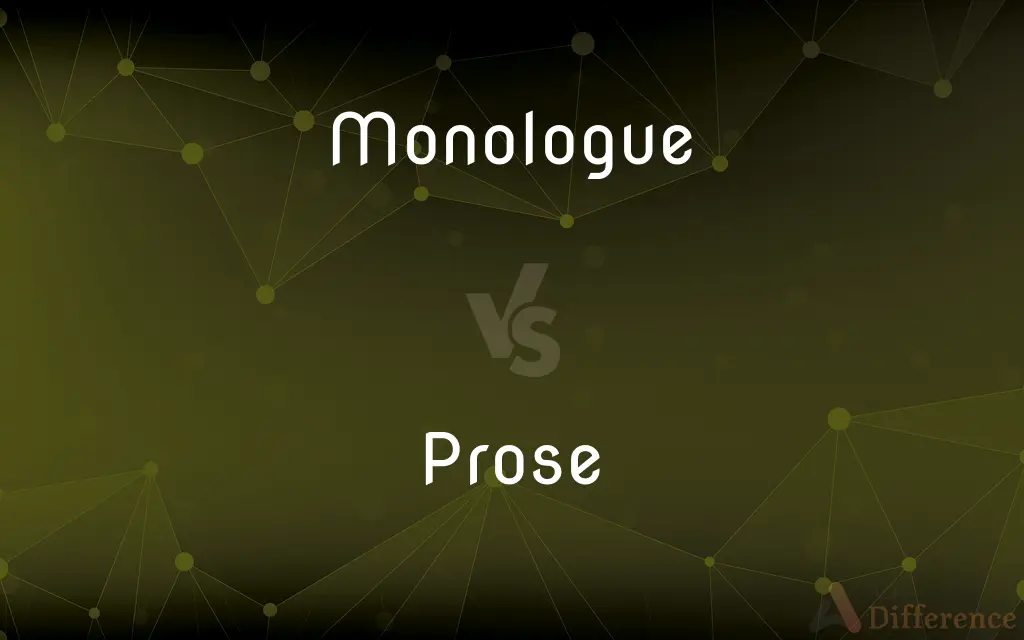Monologue vs. Prose — What's the Difference?
By Urooj Arif & Fiza Rafique — Updated on March 26, 2024
Monologue involves a single character speaking to an audience or themselves, often in drama, while prose denotes written or spoken language in its ordinary form, without structured meter.

Difference Between Monologue and Prose
Table of Contents
ADVERTISEMENT
Key Differences
Monologue is a form of speech delivered by a single character, often within the context of a play, movie, or any performance, to express their thoughts aloud or address another character or the audience. On the other hand, prose encompasses ordinary written or spoken language in a straightforward manner, without the intentional structure of verse or poetry. It's the most common form of writing, found in novels, short stories, articles, and everyday communication.
In literature, monologues are used to dive deep into a character's inner thoughts, reveal secrets, or advance the plot. Whereas prose is utilized for narrative storytelling, descriptions, dialogues, and exposition in both fiction and non-fiction, offering flexibility in expression and structure.
Monologues are a key device in drama and are primarily seen in plays and films, serving to provide insight into a character's motivations or to move the narrative forward. Prose, however, spans a wide range of genres and mediums, including both spoken and written forms, making it a versatile mode of communication.
While monologues are characterized by their focus on a single speaker and their personal viewpoint or story, prose is defined by its lack of formal structure, allowing for more varied and expansive storytelling. The structure of a monologue is usually more rigid, tied to the character and context within a specific work.
The effectiveness of a monologue often relies on the performance of the speaker and the emotional depth of the speech. In contrast, the impact of prose lies in the quality of writing, its clarity, narrative flow, and the ideas it conveys.
ADVERTISEMENT
Comparison Chart
Definition
Speech by a single character in drama
Ordinary written or spoken language
Medium
Primarily in plays and films
Found in novels, stories, articles, etc.
Purpose
Reveal character's thoughts or advance the plot
Storytelling, descriptions, dialogues
Structure
Focused on a single speaker
Lacks formal structure, more flexible
Key Characteristics
Emotional depth, performance-based
Narrative flow, clarity, wide-ranging expression
Compare with Definitions
Monologue
A long speech by one actor in a play or movie.
The villain’s monologue revealed his motives.
Prose
Lacks the structured meter of poetry.
He preferred the free flow of prose to the constraints of verse.
Monologue
Used to express a character's viewpoint.
The protagonist’s monologue offered insight into his dilemma.
Prose
Used for storytelling and information sharing.
The article’s prose made the scientific concepts accessible.
Monologue
Can be directed at other characters or the audience.
His monologue, although directed at the audience, felt deeply personal.
Prose
Ordinary language used in writing or speaking.
The novel’s prose was simple yet profound.
Monologue
Often a pivotal moment in drama.
The closing monologue tied up the play’s themes beautifully.
Prose
Encompasses a wide range of written works.
The magazine featured prose from emerging writers.
Monologue
A dramatic soliloquy revealing inner thoughts.
Her monologue touched on themes of loss and hope.
Prose
The default mode of written expression.
Her prose conveyed complex emotions with ease.
Monologue
In theatre, a monologue (from Greek: μονόλογος, from μόνος mónos, "alone, solitary" and λόγος lógos, "speech") is a speech presented by a single character, most often to express their thoughts aloud, though sometimes also to directly address another character or the audience. Monologues are common across the range of dramatic media (plays, films, etc.), as well as in non-dramatic media such as poetry.
Prose
Prose is a form of written (or spoken) language that usually exhibits a natural flow of speech and grammatical structure—an exception is the narrative device stream of consciousness. The word "prose" first appears in English in the 14th century.
Monologue
A long speech by one actor in a play or film, or as part of a theatrical or broadcast programme
He was reciting some of the great monologues of Shakespeare
He had a long and exacting monologue at the end of the film
Prose
Ordinary speech or writing, without metrical structure.
Monologue
A lengthy, uninterrupted speech by a single character, as in a play or novel.
Prose
Commonplace expression or quality.
Monologue
A literary composition in monologue form.
Prose
Roman Catholic Church A hymn of irregular meter sung before the Gospel.
Monologue
A continuous series of jokes or comic stories delivered by one comedian.
Prose
To write prose.
Monologue
A long speech made by one person, often monopolizing a conversation.
Prose
To speak or write in a dull, tiresome style.
Monologue
To give or perform a monologue.
Prose
Language, particularly written language, not intended as poetry.
Though known mostly for her prose, she also produced a small body of excellent poems.
Monologue
To address a monologue to.
Prose
Language which evinces little imagination or animation; dull and commonplace discourse.
Monologue
A long speech by one person in a play; sometimes a soliloquy; other times spoken to other characters.
Prose
(Roman Catholicism) A hymn with no regular meter, sometimes introduced into the Mass.
Monologue
(comedy) A long series of comic stories and jokes as an entertainment.
Prose
To write or repeat in a dull, tedious, or prosy way.
Monologue
A long, uninterrupted utterance that monopolizes a conversation.
Prose
The ordinary language of men in speaking or writing; language not cast in poetical measure or rhythm; - contradistinguished from verse, or metrical composition.
I speak in prose, and let him rymes make.
Things unattempted yet in prose or rhyme.
I wish our clever young poets would remember my homely definitions of prose and poetry, that is; prose - words in their best order; poetry - the best order.
Monologue
To deliver a monologue.
Prose
Hence, language which evinces little imagination or animation; dull and commonplace discourse.
Monologue
A speech uttered by a person alone; soliloquy; also, talk or discourse in company, in the strain of a soliloquy; as, an account in monologue.
Prose
A hymn with no regular meter, sometimes introduced into the Mass. See Sequence.
Monologue
A dramatic composition for a single performer.
Prose
Pertaining to, or composed of, prose; not in verse; as, prose composition.
Monologue
Speech you make to yourself
Prose
Possessing or exhibiting unpoetical characteristics; plain; dull; prosaic; as, the prose duties of life.
Monologue
A long utterance by one person (especially one that prevents others from participating in the conversation)
Prose
To write in prose.
Monologue
A (usually long) dramatic speech by a single actor
Prose
To write or repeat in a dull, tedious, or prosy way.
Prose
To write prose.
Prosing or versing, but chiefly this latter.
Prose
Ordinary writing as distinguished from verse
Prose
Matter of fact, commonplace, or dull expression
Common Curiosities
What distinguishes a monologue from prose?
A monologue is a focused speech by one character, often in drama, while prose is the ordinary form of written or spoken language, not bound by structural constraints.
Can a monologue be written in prose?
Yes, a monologue can be written in prose, especially when it aims for a natural, conversational tone.
Is prose limited to narrative fiction?
No, prose encompasses a wide range of genres, including non-fiction, journalism, and everyday communication.
Can monologues be part of prose narratives?
Yes, monologues can be incorporated into prose narratives as part of a character's dialogue or internal reflection.
Is there a difference in how monologues and prose are delivered?
Monologues are often delivered orally in a performance setting, while prose can be both written and spoken in various contexts.
What are the main characteristics of prose?
Prose is characterized by its lack of structured meter, flexible structure, and ability to convey complex ideas in an accessible manner.
What makes a monologue effective?
The effectiveness of a monologue lies in its emotional depth, the relevance of its content, and the performance (in spoken form).
How do writers use prose to tell stories?
Writers use prose to structure narratives, describe settings and characters, and convey dialogue and action in a fluid, natural way.
How does a monologue enhance a story or play?
Monologues can provide deep insight into a character's thoughts, motivations, or backstory, adding depth to the narrative.
What role does prose play in non-fiction?
In non-fiction, prose is used to explain, inform, or argue, presenting facts, ideas, and narratives in an accessible and engaging manner.
Are all monologues dramatic?
While monologues are common in drama, they can also be found in other genres, serving various narrative purposes.
How is dialogue within a novel categorized?
Dialogue within a novel is part of prose, using direct speech to reveal character interactions and advance the plot.
Can prose be poetic?
Yes, prose can incorporate poetic elements such as imagery, rhythm, and lyrical quality, blurring the lines between genres.
How can monologues influence the audience's perception of a character?
Through monologues, audiences gain insight into a character's inner life and motivations, which can influence empathy and understanding.
What distinguishes prose from poetry?
Prose is written in ordinary language and sentence structure, while poetry often employs verse, meter, and sometimes rhyme.
Share Your Discovery

Previous Comparison
Dagoba vs. Stupa
Next Comparison
Senator vs. CongressmanAuthor Spotlight
Written by
Urooj ArifUrooj is a skilled content writer at Ask Difference, known for her exceptional ability to simplify complex topics into engaging and informative content. With a passion for research and a flair for clear, concise writing, she consistently delivers articles that resonate with our diverse audience.
Co-written by
Fiza RafiqueFiza Rafique is a skilled content writer at AskDifference.com, where she meticulously refines and enhances written pieces. Drawing from her vast editorial expertise, Fiza ensures clarity, accuracy, and precision in every article. Passionate about language, she continually seeks to elevate the quality of content for readers worldwide.
















































